
Issue 065
August 2010
Psychologists and social scientists have been tormented for aeons as to why fighters possess a natural impulse to face each other in the arena of hand-to-hand combat.
It has sparked some bruising academic skirmishes, as they’ve squabbled and sprawled around the single answer which has been jabbed into their face time and time again: Man was born to fight – he just has trouble admitting it.
TRUTH HURTS
Humans have inherited a natural fighting instinct similar to that found in the animal kingdom. Though the layman would fiercely disagree and argue we are now a more ‘civilized’ and ‘cultured’ creature than primitive man with his bestial tendencies. But we only have to catch the news or dip into history to glimpse the savagery committed by man upon man. No other vertebrate habitually and cruelly destroys members of its own species as well as we do. And people have the audacity to call the greatest sport on the planet ‘brutal and barbaric’?
The Octagon is a place where bone and flesh just so happen to collide – yes, it’s violent, but so is hockey or football (which are just as aggressive). The objective is not absolute eradication of your foe; we leave that to the warmongers and politicians. MMA is a sport, and it allows millions of modern-day warriors to tap into and embrace their true fighting nature without actually having to kill anyone.
The eight-sided barricade remains one of the few platforms on earth where men can truly test their physical, spiritual and psychological limits. There are no lies – it’s a place of raw honesty, where simply victors and vanquished emerge. The experience is enlightening, as it can redefine you, expose your true colors and bring you face-to-face with who you really are.
Paradoxically for the poor souls who are in a constant state of denial, whatever potential for a fighting instinct that may have passed down has been suppressed and culturally disguised into more cowardly forms. For example the office worker on the receiving end of an unprovoked tirade from a power hungry boss with chips residing on both shoulders, or the technological advances in deadly weaponry which can strike adversaries at great distances from the safety of an armchair (or even the self-proclaimed tough guys who arm themselves with blades and bullets to tip the balance of confrontation in their favor).
The reoccurring theme here is that it seems people are afraid of good, old-fashioned fisticuffs, and will go to great lengths to avoid meeting the enemy eye to eye. This avoidance incarcerates the instinctual drive to fight (which is screaming to be set free).
Fortunately for the Special Forces of sports, mixed martial artists are able to evade the negative and devastating power of nature’s aggressive instinct by having the luxury of being able to redirect their energies positively, courtesy of a high-octane, super-fast, physical game of chess. Shrinks call this process sublimation.
Fighters’ Conviction
Ask any fighter why they fight. Try to find out what it is that draws them into a world of physical terror and emotional chaos. Answers to these questions are as diverse and colorful as the characters who step into the Octagon. Three legends of MMA share with Fighters Only their convictions as to why they fight...
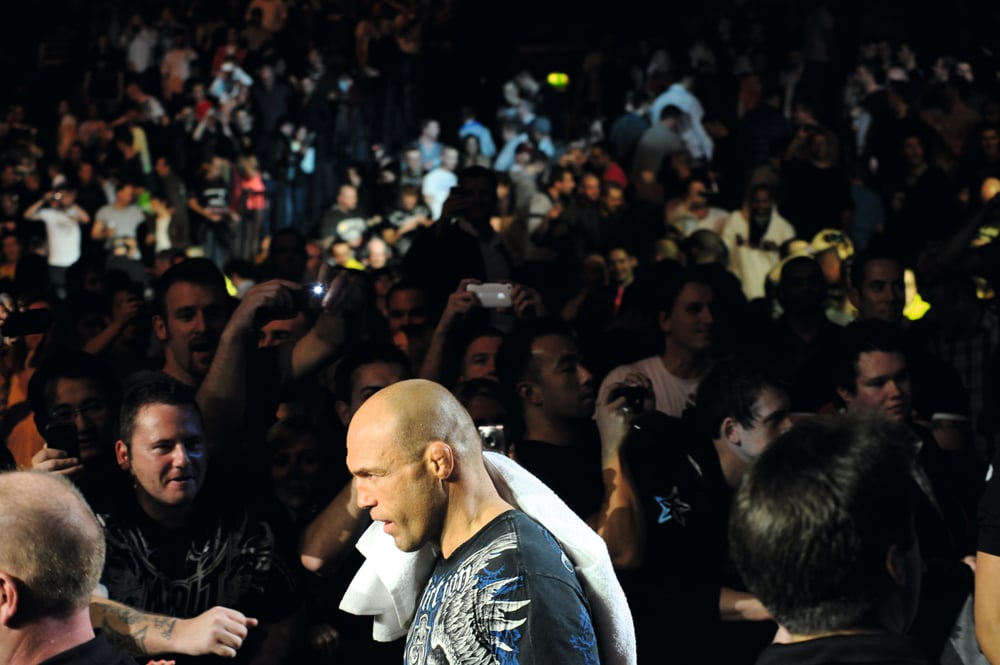
RANDY COUTURE
“I know I’ve always had a strong desire to compete and to test myself, to see how far I can push my physical limits. In that regard, I guess I’m
predisposed to combative sports. I have been testing myself in a similar fashion for most of my life in wrestling, so when mixed martial arts came along it was kind of an extension or evolution of that competitive desire.
“What initially piqued my interest in MMA was seeing my friend and former college teammate, Don Frye, competing and having success in the UFC. I felt that if he could do it, I could too. Once I got involved, I realized that it carried all of the same appeal of wrestling and provided me with the additional challenges of learning the other disciplines while also giving me the opportunity to provide a comfortable life for my family.”
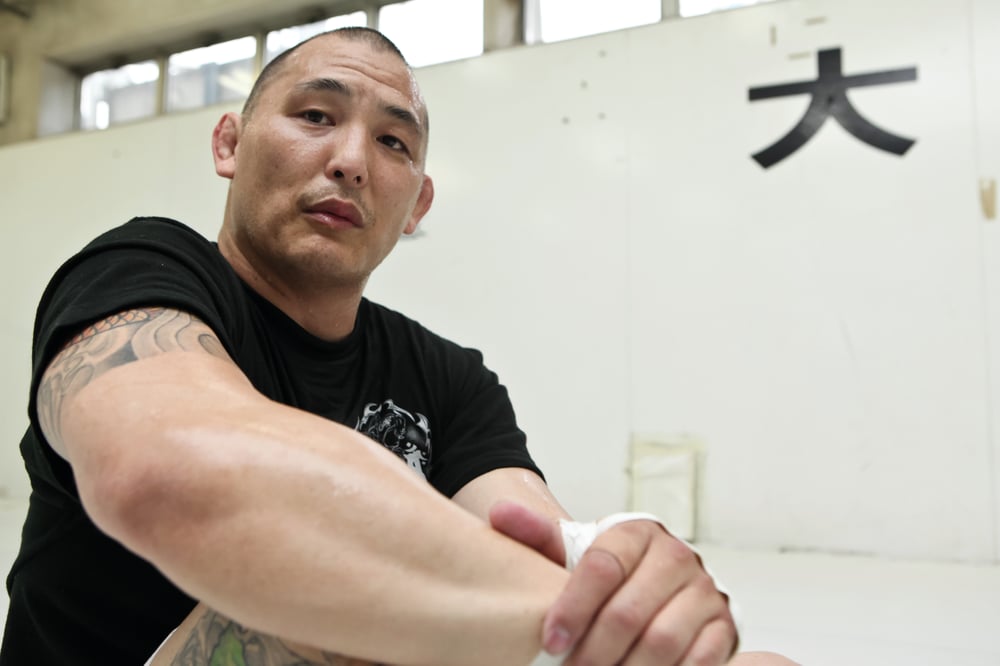
ENSON INOUE
“I wanted to be a better man. There is no better way to die than to die in the in the midst of a battle, fighting to the very end – ‘Live as man, die as a man, become a man’.
“The journey started when I was a boy. I remember watching a show about a family traveling in a car. The car flipped over and caught fire – the father managed to escape, but the rest of the family were still trapped. All he had to do was open the door, something so simple, but he couldn’t do it – he just froze because of his emotional state. His family died. I vowed to myself that I would never let that happen if ever I was in that situation.
“I wanted to improve and control my emotional states more effectively. Sport and fighting were ways of preparing me for highly stressful situations, should they ever arise. I remember being in the crowd watching Rickson Gracie in Vale Tudo Japan. When he won I lost control of my emotions – I was screaming, it was crazy. I thought to myself, ‘If I can’t even control my emotions when watching a friend fight, how would I cope if it was me fighting?’ I had to learn ways to master my emotions and fighting offered me a way to do that.
“I started off in amateur fights. I remember winning my first fight; it was an emotional rush. I controlled my emotions but not as well as I wanted, but the media took to my fight well and liked my style. I said to myself ‘just one more’. After my fourth straight win, I thought, ‘I’m pretty good at this’.”
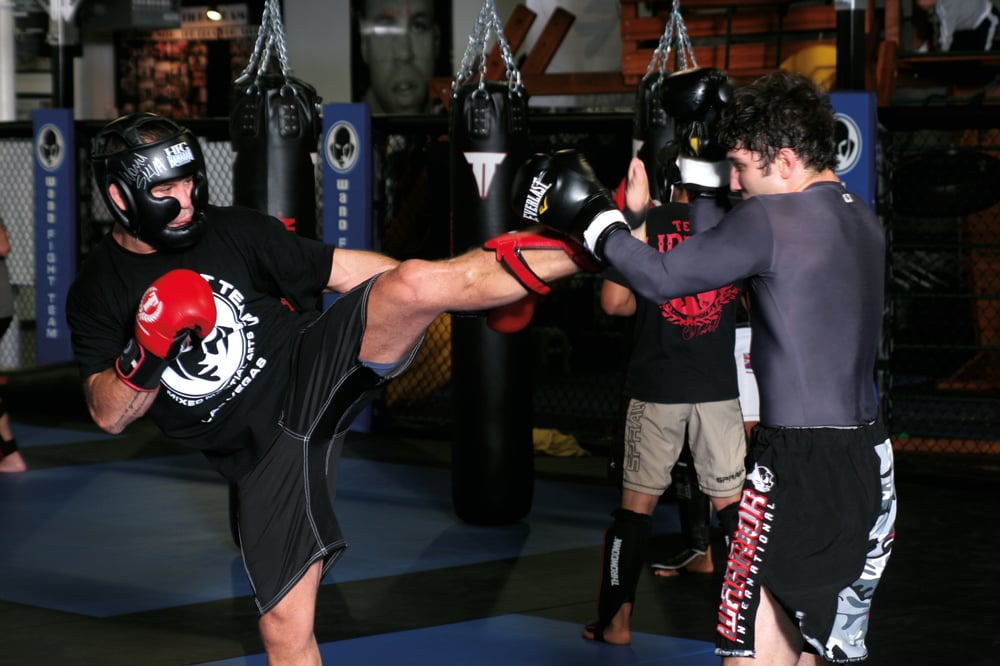
WANDERLEI SILVA
“I started to fight when I was very young and trained for different reasons, such as looks. I was also very shy, but became interested in fighting competition. I used to get very nervous – I still get very nervous, but nowadays things have changed. I attack without being afraid of my opponents. Like they say, ‘If you corner a wild dog it will attack.’ I succeed in being aggressive and imposing in my fighting style.
“I fight because it’s my job and I look at it as a job. I enjoy the challenge. I like to have dangerous opponents who defy me; it gives me a reason to train. The challenge is a big motivation for me. I try to manage the things that motivate me to improve my performance and overcome things that cause fear and inhibit me, and try not to let it affect my ability to perform. And of course the cheering of the fans – it is something only those who compete in the Octagon can feel. To see the crowd vibrating is something that really changes you.
“Why I fight is the challenge itself, the crowd’s energy and the taste of victory. The taste of victory is intoxicating – the feeling is too good. It doesn’t come easily, that’s why it feels so good, but the main reason is I love to fight – fighting is my life.”
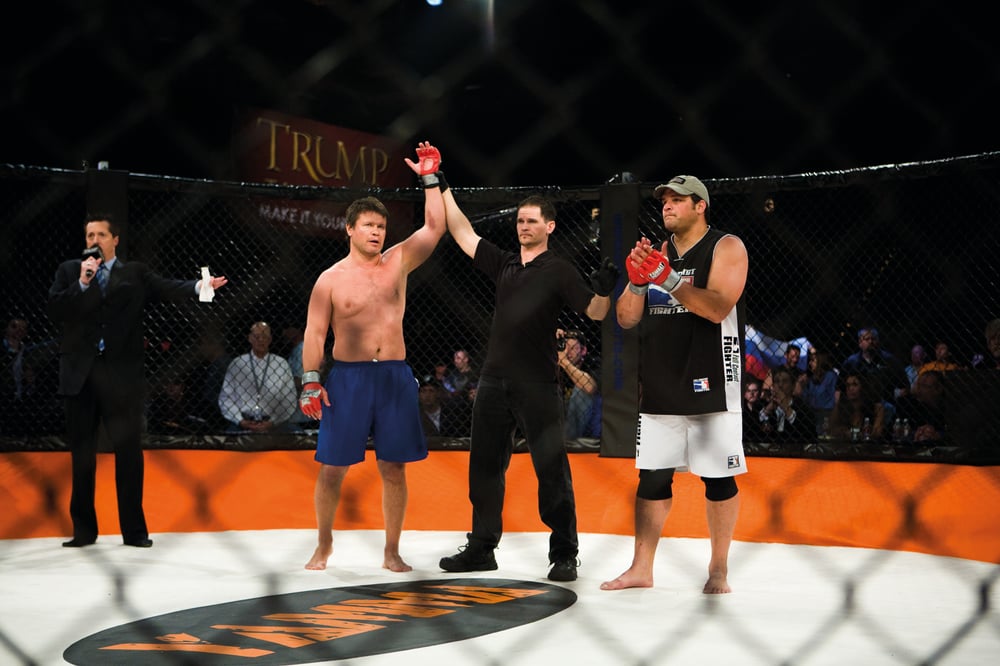
PRIMITIVE HARDWIRING
However genuine our motives as to why we may think we fight, our rationale actually only skims the surface. When we peel back the layers we discover man’s powerful impulse to fight is hardwired in part of the brain called the amygdala – which is still ruled by the hairy club-wielding behemoth.
According to Harvard professor Edward Osborne Wilson, a world-leading sociobiologist (who believes that behavior is often genetically transmitted and is subject to evolutionary processes), by definition “man is a predatory species, is naturally competitive and hostile, interested only in his desire to impose his will and dominance over others.”
Man didn’t get to the top of the food chain by being flaccid and submissive – it was his ruthless fighting instinct that got us to where we are today. The ability to fight has allowed man to adapt to his environment and survive in it. He was a hunter-gatherer who lived in small groups and his ability to fight was imperative for hunting, fending off wild animals and repelling encroachments from other tribes.
When he wasn’t fighting his neighbors or manhandling saber-toothed tigers, a competitive drive was spawned and began to develop as a consequence of constantly being on edge. It demanded a suitable discharge and competition was the perfect outlet.
This rings true with innate psychology theorists, who suggest that aggressive energies build up within all species, both humans and animals, until something triggers its release or a vent is found – but the build-up is inevitable.
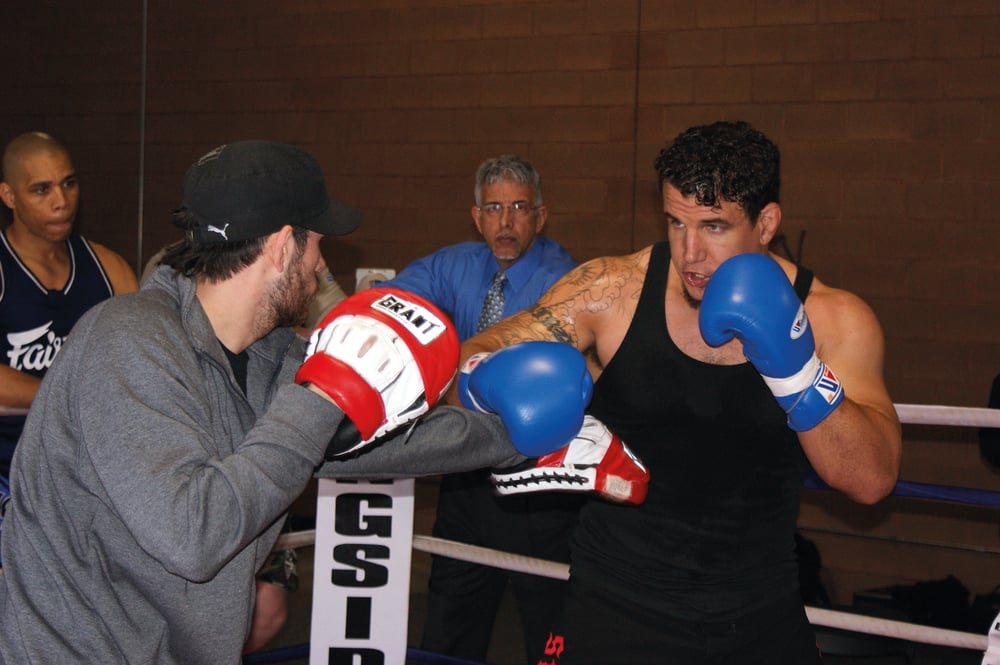
Almost any occasion for primeval men to test their abilities and measure themselves against one another served as a means to hone skills and attract the attention of women, with the added bonus of gaining respect from tribal elders and thereby boosting social status.
Thus through the ages men have fed their intense urge to compete, formally and informally, in games, public debates, proficiency in horsemanship, farming, the size and fierceness of hunted game, braving heroic feats of forbearers and even boasting the most impressive scars (we all know chicks dig scars). Yet all these displays of prowess were outclassed by courage, speed of foot and strength of arm through martial skill. The most aggressive and talented warriors had the most sex with women (what a life) and ensured the survival of their superior fighting genes by passing them on to the largest number of offspring.
This helps us understand the psychological predisposition of descendants (combatants) who’ve inherited these genetics and explains their desire to compete. In any given society, you have a select segment of unique athletes who want to physically test themselves against others in competition. Some run, some lift, some play, but few fight. MMA presents the opportunity for highly trained and self-disciplined men to test themselves to determine the better fighter.
This noble sport is producing some of the finest athletes to have ever walked, and the rate and popularity of MMA’s evolution will, without doubt, raise the profile of its gladiators to the equivalent of ancient Greek heroes. Fighters’ position in the social pecking order will be catapulted to soaring heights, gaining them greater respect and admiration from contemporary society. Their names will echo in eternity and deservedly so.
The Trouble with Testosterone
It is a common myth that testosterone causes aggression, which leads to male confrontation. Some scientists forcefully rattle off statistics and experimental evidence, while other scientists arm themselves with ambiguous or even refuting information with which to challenge this common misconception. The bottom line is that we do not know for sure whether or not testosterone is responsible for man’s aggression.
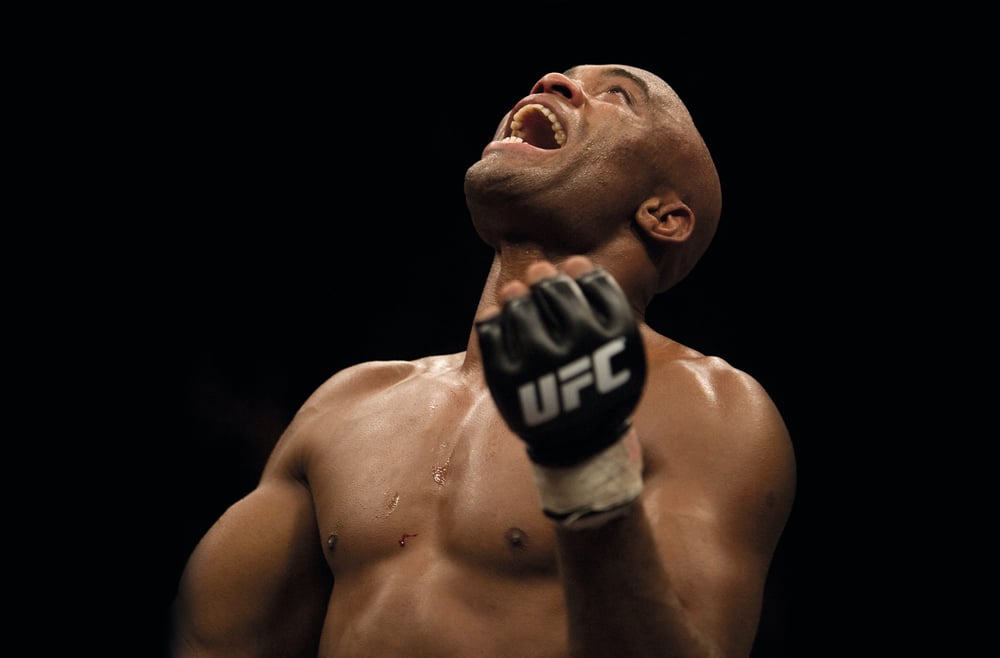
FIGHTERS FIGHT BECAUSE . . .
LIVELIHOOD
“I need to put bread on the table and keep the wolves from the door.” Diego Sanchez
TO BE CHAMPION
“I do it because I want to be the best fighter on the planet.”
Anderson Silva
REVENGE
“You beat me once, now I’m coming for you and I will hurt you.” Frank Mir
IT’S MY JOB
“I’m a pro fighter. It’s what I’m good at. It’s all I know.”
Mike Tyson
I DO IT BECAUSE I LOVE IT
“It’s a thrill. I enjoy the challenge and the rush of adrenaline when you break another man or send him to sleep. I feel alive when
I fight.” Mark Kerr
FAMILY LEGACY
“‘I wanna be with my wife at home;’
‘I’d rather be playing video games.’
I said what the fuck is wrong with you guys? I couldn’t have imagined anywhere on earth I would rather be. We were going into battle and it was the way for me to extend my family name and legacy.” Renzo Gracie
IT’S A TESTING GROUND
“It’s a way to measure my skills as a man and a fighter.”
David Haye, WBA World Heavyweight Champion and MMA enthusiast
STRESS RELIEF
“It’s a great way for fighters to channel the day-to-day shit life throws at them. Who needs anger management when you have MMA?” Greg Jackson

DEBATE DOMINATION!
Everyone is entitled to their opinions, but as ‘Dirty Harry’ says, “Opinions are like assholes: everyone’s got one!” Especially in the case of sanctimonious ignoramuses who get on their high horse and take potshots at the most courageous and entertaining spectacle in the galaxy! Naturally our impulse to rearrange their skeletal structure is our first thought, but because we are ‘civilized’ we opt for a verbal sparring match.
The problem is, the person on the verbal attack is pissing you off and, like physical combat, if you’re in a negative emotional state your thoughts become clouded. When this happens, we generally lash out with a variety of colorful phrases. If we do this, we’ve lost.
It’s not quick hands we’re working on here, it’s a quick tongue. It’s time to mirror your MMA skills with your ability to articulate your point. The art of debating is simple: It’s an exercise in persuasion, wit and logic. Stay calm, keep it short, stick to the facts and your values, and you won’t go far wrong.
OFFENDER
“It’s nothing but human cockfighting.”
DEFENDER
We have the avid boxing fan, Senator John McCain to thank for coining this term. He opposed MMA because it threatened the boxing industry’s hold on the pay-per-view TV audience. Boxing’s largest corporate sponsor was Anheuser-Busch, whose second-largest wholesaler in the country is owned by Jim Hensley, the father-in-law of senator John McCain. What a coincidence.
OFFENDER
“I don’t understand it – it’s two men trying to kill each other.”
DEFENDER
No one is trying to kill anyone. It’s two men measuring themselves against each other in a test of physical skill. You won’t understand it, because you are afraid of it – we fear what we don’t understand. To truly understand it you have to appreciate it, and this will never happen because you can’t accept it.
OFFENDER
“It’s so barbaric and brutal.”
DEFENDER
So is war, but nobody dies in the Octagon.
OFFENDER
“It’s not a real sport.”
DEFENDER
Is wrestling a sport? Is boxing a sport? Is taekwondo a sport? Is judo a sport? The International Olympic Committee seem to think they are, and MMA is combination of all of them (plus countless other disciplines) and pits them against each other.
OFFENDER
“Boxing is safer.”
DEFENDER
Really? In the 17 years MMA has been around, over 110 deaths have been recorded as a result of boxing, compared with a handful in MMA. In a 12-round boxing match about 350–600 punches land, and 90% of these are to the head. In a three- or five-round MMA fight, the action usually ends on the mat. You do the math.
OFFENDER
“Why does it have to be in the cage?”
DEFENDER
You mean the Octagon. It is actually safer, as the action can occur standing or on the ground without risk of injury to the fighters. With a ring, there is a higher probability that fighters may fall out and be seriously injured. Logically, the cage is the safer option. The problem lies in the fact that the general public see the use of a cage as crossing the boundary between sport and brutality – rings are more aesthetically pleasing to the eye. The idea of putting two men in a ‘cage’ is something that is generally not acceptable – cages are for rabid animals. If we use the term Octagon, it’s a different story.
...










